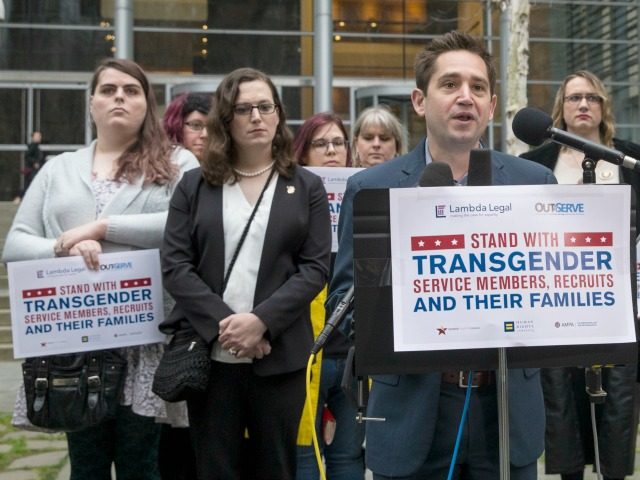Sen. Elizabeth Warren (D-MA) on Tuesday vowed to reverse the Trump administration’s transgender military policy on her first day as commander-in-chief. She also pledged to provide service members and veterans with “gender-affirming care,” which includes taxpayer-funded “transition-related” surgery.
Warren detailed her plan to uphold promises to service members, veterans, and military families by devoting a section of it to the Trump administration’s transgender policy. She vows to, on day one, “reverse it” completely.
Warren wrote:
“Our national security community is weaker when LGBTQ+ Americans are excluded. I have opposed the Trump Administration’s shameful ban on transgender service members from the start – and I’ll reverse it on the first day of my presidency.
However, the claim that Trump is excluding LGBT Americans from the military and outright “banning” transgender service members is not necessarily true. The original rule, as Breitbart News reported in January, largely addressed individuals whose gender dysphoria requires expensive surgeries that “render them unable to serve for significant lengths of time.”
“The specific military need is that those serving in uniform must be ‘free of medical conditions or physical defects that may require excessive time lost from duty,'” as Breitbart News reported in January:
The American Psychiatric Association’s current Diagnostic and Statistical Manual of Mental Disorders (DSM-IV) has long categorized transsexuality as such a condition, first calling it “transsexualism,” then “gender identity disorder,” and most recently, “gender dysphoria.”
On July 26, 2017, President Trump announced that the U.S. military would generally continue its policy of not allowing transgender individuals to serve. DOD subsequently formulated a policy allowing some transgender individuals to serve, but that transgender individuals who would be unable to deploy on miss. This policy was implemented in October 2017.
Pursuant to subsequent orders from the commander-in-chief, then-Defense Secretary James Mattis recommended that transgender individuals cannot serve if their gender dysphoria requires in expensive gender reassignment surgery or other therapies that render them unable to serve for significant lengths of time. The specific military need is that those serving in uniform must be “free of medical conditions or physical defects that may require excessive time lost from duty.”
President Trump adopted that recommendation for a revised policy in March 2018. Federal judges in Washington State, California, and D.C. issued injunctions blocking the new policy – which again, actually merely preserved the decades-long policy – and the Trump administration appealed all three.
Nonetheless, Warren took her pledge a step further, promising “gender-affirming and culturally-competent” health care for LGBT service members and veterans.
“A Warren VA will ensure that every LGBTQ+ person can get the equitable, gender-affirming, and culturally-competent health care they need,” Warren stated, specifying that it includes taxpayer-funded “transition-related surgery, and allowing providers discretion to deem gender-affirming procedures as medically necessary based on an individualized assessment.”
According to Warren, the “gender-affirming” health care “will also be available under Medicare for All.”
“Professional medical associations recognize the need for transition-related surgery,” she added. “VA’s blanket exclusion policy of medically necessary treatment is not grounded in medicine; it should be repealed.”
Warren also promised to “invest in the VA” and said her administration will “not cut the high-quality, evidence-based, culturally competent programs that our veterans rely on,” once again touting Medicare All as beneficial for veterans.
“And under Medicare for All, veterans will all have high-quality health coverage that gives them the option to seek care from non-VA doctors and hospitals for no additional cost,” Warren said.
“If there isn’t a VA close to where they live, Medicare for All will ensure that veterans still get the care they need when they need it,” she added.

COMMENTS
Please let us know if you're having issues with commenting.